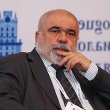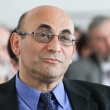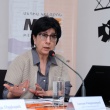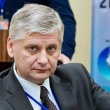Possibilities and Understanding of the Karabakh Conflict Resolution 25 Years afterthe Ceasefire
On May 27-28, 2019, an online-conferenceon the topic of Possibilities and Understanding of Karabakh Conflict Resolution 25 Years after the Ceasefire was held on the PublicDialogues website(www.publicdialogues.info). The conference was organized within the framework of the “‘Political Dialogues’ for Communication between Armenian and Azerbaijani Specialists” project, implemented by Region Research Center.
This project was supported by Black Sea Trust of Regional Cooperation Marshall Fund.
The Institute for Peace and Democracy (the Netherlands) is a partner to the project. The Public Dialogues website was created in 2012 by Region Research Center and the Institute for
Peace and Democracy which operated in Azerbaijan back then.
Who participated in the discussion?
Alexander Iskandaryan (Armenia) – political scientist, Director of Caucasus Institute
Arif Yunusov (the Netherlands) – political scientist, Institute for Peace and Democracy
GrazvydasJasutis (Lithuania) – guest professor,Geneva Institute of International Relations and Development
Sergey Markedonov (Russia) – leading researcher at the Center of Euro-Atlantic Security, International Studies Institute, Moscow State Institute of International Relations
Laura Baghdasaryan (Armenia) was the moderator of the conference –Diector of Region Research Center
What questions and aspects were discussed?
- The essence of the parties’ understanding of the conflict, the transformation of the perception of the settlement process as compared to the past,
- The possibility for NKR’s participation in the negotiation process from the perspective of the interest of the parties to the conflict and the effectiveness of the process, and the mediators' attitude to this,
- The mediators and their tools to prevent escalation at the front, levers of pressure by international forces to force decisions on Karabakh, the possibility of their application, the tendencies of skirmish resumption on the front in the recent months, the reasons behind these developments,
- The feasibility of expanding the composition of intermediaries involving more neutral countries,
- The impact of the domestic legitimacy of the government on the process and decision-making on the conflict,
- Negotiations as a project for peace or an element of policy pursued by the parties and other interested countries,
- The objectives behind Armenia’s message: "New War - New Territories",
- The message behind the formulation used by Azerbaijan “Territory in exchange for non-war” is blackmail addressed not only to the Armenian side, but also to countries that are not interested in military escalation in the Caucasus region,
- Problems in the implementation and the significance of humanitarian measures, declared by the parties to the conflict after the meeting in Moscow in April 2019,
- Leaving the negotiation process is reasonable from the point of view of the interests of the parties,
- Public perceptions and public attitudes in the context of the Karabakh conflict.
This is not the complete list of questions and aspects that were discussed by the participants during the two days of discussion.
From the materials of an online conference (May 27-28, 2019)
On Different Paradigms of Understanding the Essence and the Resolution of the Conflict Held by the Parties
Laura Baghdasaryan - About two weeks ago, it was 25 years since the signing of the Agreement on the cease-fire in the Karabakh conflict zone. The negotiation process has since developed in a zigzag manner, but it did not reach any final arrangements on a peace settlement, and it did not get to the point when one of the parties would leave the negotiations. The parties went to negotiations, clearly realizing that much would be impossible to achieve, because they needed negotiations as a process that was a solution to many of their problems. And we must pay tribute to the mediators who have managed to combine fragments from completely different paradigms of the parties’ understandingof the essence of the conflict and their visions of its resolution in different proposal packages.
In essence, the interpretation of the conflict between the Azerbaijani and Armenian parties remains to belong to different systems,by definition.
This is a territorial conflictfor the Azerbaijani party, therefore for the resolution of this conflict Armenia (!!) must “ensure territorial integrity within the international borders of Azerbaijan, ensure the return of internally displaced persons to their homes, and promote the peaceful coexistence of the Azerbaijani and Armenian communities of the Nagorno Karabakh region of Azerbaijan.” This is a quote from the statement of the Ministry of Foreign Affairs of Azerbaijan, regarding the 25th anniversary of the ceasefire agreement.
In the perspective of the Armenian party, the conflict is legal, proceeding from the realization of Artsakh people’sright to self-determination, therefore “the conflict resolution scenario should be acceptable to all three parties - the peoples of Armenia, Artsakh and Azerbaijan” and “... substantive negotiations and results are possible only if Artsakh is involved in a process that will ultimately determine its status and provide guarantees for the safety of the people living there. We are convinced that the trilateral agreement is a real basis on which long-term peace and cooperation can be built.” These are quotes from the statement by the Prime Minister of Armenia N. Pashinyan,which was made in relation to the same date mentioned above.
Grazvydas Jasutis - The position of Azerbaijan has not changed, and the political elite in Azerbaijan has not been changed or "updated." The Aliyevdynasty hasclearly formulated their goals and, frankly, they follow their line without changes and compromises. I would say that they make some compromise in terms of the process, but not in terms of results. Also, I would not say that Azerbaijan is blackmailing, although some actions and statements may hint at it.
Alexander Iskandaryan - In principle, there is more or less of a consensus in the society and the elites regardingthe basic foundations of the settlement in Armenia. This consensus is as follows: 1) Karabakh cannot be in a situation of vertical relations with Baku. 2) Security guarantees are required for any settlement. Now these are the army and the configuration of the borders. In order to sacrifice them, you need to replace them with at least something equally solid. No "paper" can be a solid guarantee by definition, due to the lack of basic trust.
Accordingly, the settlement is an extremely distant perspective, to say the least.
The Azerbaijani perspective, at least publicly, is a return to the situation before 1988, i.e.Karabakh is an autonomy within Azerbaijan. Since Azerbaijan understands the Armenian position, they also understand the illusiveness of any consensus on such a basis, hence a consensus-based settlement is seen as a purely hypothetical perspective.
Yes, over the past two years, after April 2016, the position of the Armenian sides has really toughened. The mainstream idea currentlyheld in Armenia is that Armenians have no real partner for negotiations. While in Azerbaijan, the strategy is built around a combination of a non-substantive negotiation process with attempts to weaken Armenia and NKR through various activities.
Sergey Markedonov - How do the parties understand the settlement? As the triumph of their own "truth," just like before. This is the public perception of the situation. Compromises are perceived as a weakness,to put it mildly, and almost as a betrayal. Hence a question arises: why even negotiate if there is no desire and will to reverse the existing trends? No such will, truly. But not only put up with it, but also to fight it. The Armenian side feels that it is the beneficiary of the status quo. It does not need military shocks. The Azerbaijani side, on the contrary, does not like the status quo. But Baku understands that complete “defrosting” of the conflict is a costly enterprise. The war will write off a lot, but only in case of a victory. And what if ....? The experience of Mutalibov and Elchibey is too eloquent. Defeats entail the threat of losing power. Hence, the rejection of radical tactics, the desire to supplement coercive pressure with diplomatic pressure, the unwillingness to look like, first of all, “war-mongers”to the world and mediators. Hence, there are no resources for a final victory, but there is no readiness to seek a compromise either.
On the Link between N. Pashinyan’s High Legitimacy and the Settlement of the Karabakh Conflict
Sergey Markedonov - Over the past year I have participated in many international fora dedicated to the Karabakh settlement. The leitmotif has been as follows: for the first time in many years a legitimate power has come afore in Armenia, the new Prime Minister NikolPashinyanenjoys massive support and popularity. Consequently, the solution to the conflict is not far off, because a power that enjoys public support can afford concessions and compromises. Theoretically, this just looks beautiful! But in practice, the society that we have in Armenia today does not give Pashinyan a mandate to make concessions, much less a “surrender of positions” (and any compromise is taken with apprehension). And it will not give it in the foreseeable future. This explains the toughening of positions by the country's leadership that has been noted by many.
Alexander Iskandaryan - To put it politely,the thesis about the direct impact of the domestic legitimacy of the government on the process seems somewhat caricatureto me. Firstly, because the duration of the format for the settlement of the Karabakh conflictis fundamentally longer than the legitimacy of any government, this kind of conflict cannot be resolved simply by the will of any people who come to power, legitimate or not.It is not a personal issue. It is possible to mess it up, yet it is impossible to settle it. And the second point is that very often the masses from the generalpublic are more radical than the leaders. A change of leaders, especially in democracies, can lead to the deterioration, and not to the improvementof settlement prospects. Preciselybecauseleadersneedlegitimacy...
Arif Yunusov - Much has to do with Pashinyan’s figure and with the inflated expectations from him. The issue is not about legitimacy or the lack of it: this factor does not play a role in conflict resolution, it is from the domain of political games, rather than that of settlements. The question is that Pashinyan initially became the symbol of a new and, most importantly, democratic Armenia. And he managed to win not only great support in the Armenian society and abroad, but most interestingly and importantly, also among a certain part of the Azerbaijani society, which is long tired of Aliyev’s rule and has been putting forward demands on the changes necessary in the country. As a result, there was even a new factor, emergingwithin the Karabakh settlement context under the name of "democrat-dictator". It may sound paradoxical, but Aliyev could make concessions to S. Sargsyan (Editor– the former President of the Republic of Armenia), but he will not make concessions to Pashinyan, who has come to power on the wave of the revolution and has the image of a democrat. Manydonottakethismomentintoaccount.
On the Response to the Question on NKR’s Inclusion in the Negotiation Process
Sergey Markedonov – In the earlier stages too, the Armenian leadership used to say that any solution to the conflict should definitely take into account the opinion of the Karabakh people. But it is one thing to appeal to their opinion, and quite another thing to demand the presence of the NKR delegation at the negotiations.Certainly, such a formulation is not acceptable for Azerbaijan. Armenian experts, politicians and diplomats refer to both the Bishkek Protocol and the Agreement of May 12, 1994, referring to the involvement of the NKR as precedent. Well, that is right, but in politics it is important to use the right moment. As the classic figure taught us, "Today is early, tomorrow is too late." No one will return the missed opportunity of involving NKR in the negotiations in advance as of today... Certainly, the presence of a separate NagornoKarabakhdelegation will not automatically make Baku more compliant. And it shall not necessarily make the negotiations much easier. Moreover, at the very beginning, theKarabakh people may bring in additional emotions, which are not always constructive to the same. There will be new political declarations, slogans, and accusations. But does this mean that real problems will not be discussed? Is NK’s status a virtual problem? How about the status of the territories around the former NKAO? Especially since out of these seven territories the situation of Lachin and Kelbajar differs from that of Fizuli or Zangelan. The first two have actually become anintegral system with the unrecognized NKR. I am not sayingthis is good or bad, this is just a statement of the fact. Hence, real problems will be discussed, because we cannot get away without them. But a new topic will arise. At first glance, if the NKR is allowed to the table of negotiations, Armenia will score a victory. Yerevan will achieve what it has been afterfor many years already. However, this will be the case at first glance only. Indeed, in the case of such a scenario, it will be difficult or almost impossible to say that the interests of Karabakh Armenians are not being taken into account. Baku will have an opportunity to oppose: we have opened up the possibility of involving the Karabakh people. Hence, time has come for substantial talks. However, the Armenian party does not have any willingness to approach the essence of the negotiations. Therefore, I draw your attention to some dividends Azerbaijan can extract from such a scenario.
Arif Yunusov– As my colleagues have already noted, everything is fine in its due time. Yes, certainly the Karabakh party took an active part when a decision on a ceasefire was being made back in 1994. That is right. But the impulse set at that time did not have a continuation ... And it was even more naive to expect that IlhamAliyev would hasten to agree with Pashinyan’s proposal, which is supported by many people abroad, and even in the Azerbaijani society. Aliyev’s image is clearly different and he is losing to Pashinyan in this matter on all possible points. In this regard, Sargsyan as a figure was very convenient for Aliyev.
Here is my opinion on this issue: I have always believed and I do still believe that from the very beginning Azerbaijan should have held an active dialogue with the Karabakh Armenians. And without any mediators. This is still the domestic conflict of Azerbaijan. But the decision to change the format and to transfer it onto the Baku-Yerevan plane was a mistake made by Azerbaijan and the mediators who agreed with it. But I try to look at problems pragmatically and today all these points belong to history. It is all in the past. Today, the official Baku is categorically against the participation of Karabakh Armenians in the negotiations. Rather, he believes that the Karabakh authorities will definitely be involved, but only when the Great Peace Agreement is signed and the implementation stage is launched. At that time, before the final settlement of Karabakh’s status it will be necessary to give the Karabakh authorities a temporary interim status, because a lot of things in the region will have to be implemented jointly with them (the return of the refugees, infrastructure rehabilitation, etc.). This is the position of Azerbaijan today. And this has to be considered. I agree with Sergey Markedonov that with a more subtle game, Azerbaijan could extract many dividends for itself if Karabakh Armenians participated in the negotiation process. But...
Alexander Iskandaryan - Azerbaijan will not negotiate with any KarabakhArmenians. Pashinyan will not refuse the negotiations. He will keep, from time to time, say things about who elected him, and who did not. Negotiations will continue, they will not be substantive. As was the case in all previous years ... In my opinion, it is impossible to equalize the Armenians of Karabakh and the Azerbaijani refugees. Karabakh Armenians are organized as a state. Unrecognized of course, but a state. They have leaders, structures, a constitution, control over the territory, eventually an army. Refugee Azerbaijanis who are scattered all over Azerbaijan and the world have none of this. Refugees are a humanitarian problem, Karabakh is a political entity, these are two different things. Otherwise we would have to negotiate with the Baku, Kirovobad, Shamkhor communities and so on. Approximately 1.5 times more Armenians lived in Baku alone than in the NKAO. Is there no need to negotiate with them? Of course, the problems of refugees are and should be taken into account, but this is a problem of a humanitarian nature. And this is not about morality at all, simplyKarabakh will not agree to equalize itself, as a political entity, with a community of people who cannot be even be really take into account. It will not work.
Grazvydas Jasutis– I would not mind seeing NK as a participant in the negotiations process. However, the presence or absence of NK does not affect the dynamic of the negotiations. Suppose, the Nagorno-Karabakhdelegation is present. So what? Azerbaijan would not be delighted with their presence and would completely ignore them, but at the same time, it is not clear how the mediators would react to them. In addition, a strong emphasis on NK’s participation makes it difficult to discuss real issues. This may be tactics in the negotiations, Yerevan insists on Nagorno-Karabakh and can use it as a card for the deal.
"New war - new territories" vs. "Territories in exchange for peace"
Sergey Markedonov - A number of points should be highlighted, regarding the statement made by D. Tonoyan (Editor–the Statement made by the Minister of Defense of the Republic of Armenia, dated March 30, 2019). And the most important thing is the context of inflated expectations. It was necessary to send a political signal indicating to their groundlessness. It is obvious that the head of the Foreign Ministry (of the RA - Editor) cannot convey such a message. The Ministry of Defense, “the hawk” is better suited to this role. We should note that nobody leaves the negotiation process, no one declaressuch intentions. Simply a "red line" is being drawn. Andto this end, theconflict may be“defrosted” by force.
Grazvydas Jasutis - It seems to me that the message of the Minister has three objectives. First, it is aimed at the local community of Armenia and the Diaspora, which wants to get assurances that Armenia is still ready to defend NagornoKarabakh. His second objective was to "inform" Azerbaijan of the unacceptability of offensive operations and that their previous success would not be repeated. The third message was addressed to the international community. It is always better to have a hawkish position at the beginning and soften it later. In other words, he marked some space for maneuvers.
Arif Yunusov–As for the role of blackmail in the negotiation process, in fact, this is normal. Of course, the ideal option is when the parties respect each other and solve the problem, based on a compromise. But this is in the ideal case scenario. In reality, we see that everything is much more prosaic and worse, that there is no respect and trust, but there is a desire to achieve his objective and force the other side to make concessions. Therefore, for a quarter of a century, both sides only blackmailed each other. Blackmail hasbeen applied by the mediators, too, who either subtly or explicitly demonstrate this. That is to say, blackmail isunfortunately a part of the negotiation process.
Karabakh Conflict in theDoestic Political LandscapeContext
Sergey Markedonov– I think it is time to return to Laura Baghdasaryan’s thesis that "with Pashinyan coming to power, he became particularly acutely used as a factor in the domestic political struggle." There is something to consider here. In his recent speech, where the Prime Minister of Armeniadeclared the “second most important stage of the revolution”, the situation in Karabakh was actually put on a par with the judicial reform (“surgical intervention in the judicial system” if we quotePashinyan’sevaluation). That is the rub!Just like Karabakh, which for decades has been a national symbol for Armenia, is a kind of myth (not to be confused with fairy tales, here the audience is enlightened, and understands what is going on). And suddenly, today, many people speak of the NKR as a kind of "Armenian Vendée." And also, it is time to speak about the complex dialectical relations between Yerevan and Stepanakert. On the one hand, Karabakh is the most important national symbol of the post-Soviet Armenia and a point of consensus among the main political forces. On the other hand, Yerevan has quite frequently looked at Stepanakert as an oppositional force, whicheven claims to be the best entity to voice Armenian interests ... It is not excluded that democracy will come to Karabakh and the power will become more open, more dynamic, unlike B. Sahakyan (Editor–the President of the NKR), who has been in office since 2007! But this will not lead to fundamental changes in the relations with Baku. This is what should be borne in mind by the supporters of the "transitionapproach."
Alexander Iskandaryan - The question is extremely interesting. But it has to do with relations and matters within the Armenian circles, it is not about either the settlement or the non-settlement of the conflict. It is about the continuation of the transit of elites in the Armenian societies. The tradition in the "Armenian world" has set a requirement for the leaders of Karabakh and Armenia for a sort of compatibility. The Russian word does not reflect the meaning in English it is better "compatible". Currently this is not the case. Just as the transit hapenedfirst in the executive power, followed by the legislative branch, and intermittently in the local authorities too, now the turn of the judiciary has come to be followed by the fourth power, if there is still sufficient drive and power, and so on. A change of the mode of interaction between Armenia and Artsakh should also occur. It is not easy thing, because we are dealing with a different state, in the end. But the process is underway. It is stretched in time, the first dissents appeared immediately after the revolution, and it would have been strange if they did not. This is not a new thing, there have always beendissents between the Karabakh elites and the elites of the Republic of Armenia, starting with times of the first President. Until a new mode is found, we will observe what are witnessing now. Then the dissents will again go "under the covers." However, this has almost nothing to do with the resolution of the conflict. Well, maybe besides the fact that in Azerbaijan they are closely watching all these developments, cherishing a hope for a serious internal Armenian failure. However, I think that is in vain, since this construct (of the Armenian-Karabakh relations) has a very serious margin of safety.
Grazvydas Jasutis - I very closely follow the political landscape in Azerbaijan, which is rather static and stagnant. We thoroughly discussed the impact of the changes in Armenia on the conflict. What do you think about any changes in the political elite in Azerbaijan? Should we talk about post-Aliyev Azerbaijan and a new policy for the resolution of the conflict?
Sergey Markedonov - It seems to me that in the event of a hypothetical change of power in Azerbaijan, there will be no drastic changes in relation to Karabakh! Yes, a more open regime may be established, the pressure on human rights defenders will decrease. But as for Karabakh, it is unlikely that even Aliyev’s harshest critics will express themselves very differently from him. And some may be even tougher in their evaluations. This can be confirmed by the evidence available in the social networks and blogs, total darkness! Therefore, a general political dynamism instead of “stagnation” does not yet mean dynamism in the peace process. In this case inertia is stronger. After all, we are talking about identity, national solidarity. These concepts matter much more than being for or against Aliyev.
Arif Yunusov–When we speak about the situation, we proceed from the existing political landscape, paying attention to those who are spotlighted by the press. However, the option of a social explosion is quite likely, too, as a result of which new leaders will come to power. And here we come to the main point: there is no need to harbor illusions about serious breakthroughs in the Karabakh issue in the event of a change of power. In a quarter of a century, the positions of the parties to the conflict can be said to have been clearly formed and today there is a “red line” which no one will risk to cross, at least today. Pashinyan's example testifies to this. Moreover, the new government will most probably try first to raise the bar in the negotiation process (just like whatPashinyanis openly doing at the moment), then begin the negotiation process from a more convenient platform. However, it is also probable that radical forces will come to power, and everything is possible in this case. Includingalarge-scalewar ...
Who Needs to Be Prepared for Peace – the Authorities or the Peoples?
Sergey Markedonov - What is primary to the conflict, the people or the authorities? This is an eternal question. If I paraphrase Henry Kissinger just a little, "What number should I dial for people to answer." Did Aliyev and Pashinyan (and earlier Sargsyan and Kocharyan) come from the Mars? Are they not the people? They turn their speeches, statements to those who are the people. We should note that many “ordinary citizens” would be much ahead of professional bureaucrats and diplomats in terms of their radicalism, xenophobia, and hatred. Let usrecall history from the period of 1988-1991. Political liberalization against the background of the collapse of the CPSU created opportunities for open debates, granted freedom for rallies and demonstrations. And didn't the radicals take advantage of this freedom? Didn’t hundreds of pamphlets claiming the “birthright” of their people in a particular territory appear? Didn’t many rallies and demonstrations simply turn into banal pogroms and ethnic cleansing? Was it all not the"people"? Of course, the proponents of the “populist point of view” are prepared to have arguments about “KGB agents”, specially disguised as regular citizens and so on. But weren’t there too many "agents"? Probably such a numberwould be physically impossible to ensure. And the last (in order, but not least). Politicians in Armenia and Azerbaijan are turning to people. If ordinary citizens did not accept the "logic of conflict", were tolerant to "outsiders", how many politicians would have lasted in power? Most likely, not for long, they would just be overthrown. In practice, it’s enough to look at the electoral results of ex-President of Armenia LevonTer-Petrosyan, whose political association, which emerged in the 2017 parliamentary elections with the idea of a compromise on Karabakh, did not even end up in the National Assembly. In Azerbaijan, such parties are not visible at all. So here is the answer that shows whether the people did really have "anything to do with or not" ....
Alexander Iskandaryan– Both Pashinyan, and Kocharyan, and Sargsyan were "ordinary citizens." There is a public demand and politicians must comply with it. Even politicians who are not democratic, even dictators. Well, Comrade Stalin did not personally stand at the gates of each camp, he did not personally shoot all the Trotskyists and he did not write four million interrogation protocols, asDovlatov puts it. And Hitler did not personally fight on all fronts, shoot civilians in cohorts and burn all Jews in furnaces, no matter how politically incorrect it is to say this. Some things the society does give carte blanche for, it does not for others. And in this matter the Dutch society is different from, say, that of Zimbabwe. That is why in Georgia an Azeri person generally behaves differently as compared to the potential behavior in Azerbaijan. This is especially true in cases of democracies. Pashinyan, strictly speaking, had no agenda on the Karabakh conflict, he came to power purely based on social and anti-elite discourses. By the way, leftist elites, and in classical termsthis works against pronounced nationalism. So what? There is also the function of the chair. He absolutely had to demonstrate harshness and here you are–Artsakh should be a party to the negotiations, and D. Tonoyan’s statements followed. Well, do not you assume that Tonoyan made these statements all by himself, without asking the authorities?
Arif Yunusov - There has always been demand for peace, the matter is about the scale of the demand. I believe that today the level of such demand for peace is very insignificant, in both societies the level of radicalism is very high, and therefore we should rather talk about the existing demand for a new war rather than peace. Today, the task of the representatives of the two societies is to prevent escalation and war. And peace is most likely the task of another generation.
Grazvydas Jasutis - There is a natural need for peace, but I can remind you that we must be ready for war in order to achieve peace. Peace cannot be granted, but in my opinion, it can be imposed by strong international actors. It will not derive from local initiatives, since the goals and results that Azerbaijan and Armenia want to achieve are incompatible. The international community and very influential countries may impose this decision, but 1). they must agree among themselves and 2). they must have the political will and resources to do this.
Please read the full material of the internet conference in Russian here: http://www.publicdialogues.info/node/814







